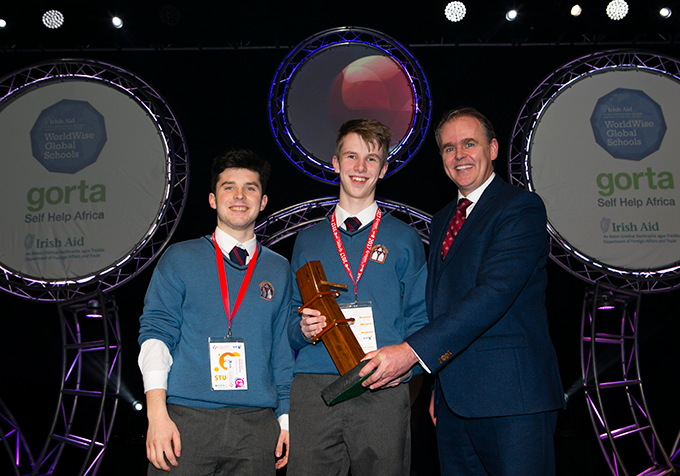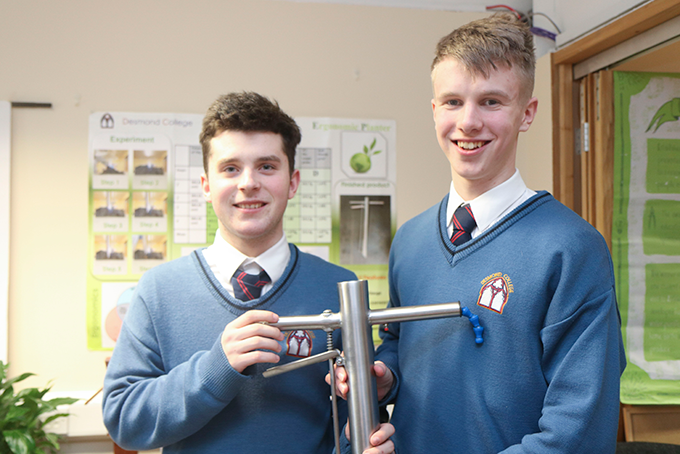Sponsored by WorldWise Global Schools, Gorta-Self Help Africa and Irish Aid

Minister of State for the Diaspora and Overseas Development Aid Joe McHugh TD presents the Sicence for Development Award to Jack O'Connor, Diarmuid Curtin, Desmond College , Limerick for their project "Ergonomic Planter" at the BTYS January 2017 (Credit: Fennell Photography)
The annual BT Young Scientist & Technology Exhibition is attended by over 60,000 people including members of the public as well as students and teachers from across Ireland. BT Ireland is the main sponsor and organiser of the Young Scientist and Technology Exhibition. The exhibition gives students, aged between 11 and 18 years, a platform to showcase their ideas and talents in the science and technology arena where they compete for the title ‘BT Young Scientist of the Year’. As part of the BT Young Scientists and Technology Exhibition there is a special category called the Science for Development Award.
The Science for Development Award was established in 2006 and is organised by Gorta-Self Help Africa. The award was established to encourage teachers and students to develop ideas, using appropriate scientific technology that may address challenges and prove useful at local community level in the Global South, to reduce poverty and promote social justice. Some of the challenges faced by people in the Global South include; cooking, food preparation and storage, poor sanitation, inadequate healthcare, access to drinking water, poor soil fertility etc.
By looking at issues of poverty and social justice students gain a greater insight into the wider world, and their role as global citizens. To view past winners of the award please visit the Gorta-Self Help Africa page.
Irish Aid, WorldWise Global Schools and Gorta-Self Help Africa have jointly sponsored the special category for the past 12 years. Irish Aid provides €5,000 towards the award through WorldWise Global Schools which coordinates Irish Aid support for Development Education to post-primary schools. The winners of the award receive a perpetual trophy and a €5,000 bursary for one student and one teacher to travel on a fact-finding/field testing visit to a country in Africa, in association with Gorta-Self Help Africa.
The Science for Development Award is open to any entrant who has been accepted in the Intermediate or Senior sections of the BT Young Scientist and Technology Exhibition and whose project addresses issues faced by people in the Global South. The BT judging panel will select finalists for the award and their criteria is as follows:
Criteria - The winning project of the Science for Development award should:
1. Show a clear understanding of the causes of poverty, injustice and inequality in a Global South context and a willingness to learn more [Issues could include: Food and livelihood security; climate change and the environment (e.g. deforestation, clean water and sanitation, fertile soil, soil erosion, fishery, energy, air quality, pollution); gender equality; appropriate technology; access to education; health issues e.g. HIV/AIDS, TB, maternal/child health, etc.]
2. Use appropriate and sustainable technology, solutions and/or materials that can be adopted and implemented at local community level in the Global South.
3. Demonstrate a clear understanding of the local context, target audience and needs, which the project is designed for.
4. Demonstrate an understanding of the connections between the local (Ireland) and the global level in relation to the chosen development issue and project, as well as an understanding of a partnership approach to development.
Category: All
Age Group: Intermediate & Senior
Information on the Science for Development Award: Self Help Africa

Winner of the Science for Development Award, students Diarmuid Curtin and Jack O'Connor, Desmond College, Newcastle West, Limerick with their Ergonomic Planter (Credit: GSHA)
On January 13th, students Jack O’Connor and Diarmuid Curtin from Desmond College, Newcastle West, Co. Limerick became the recipients of the first award of the evening, presented at the 2017 BTYSE prize giving ceremony. Their technology project, an Ergonomic Planter for use in developing countries, scooped the Science for Development accolade at this year’s competition.
Jack and Diarmuid, both sixth year students, developed a planter, which aims to minimise seed/ plant wastage, improve production by ensuring consistency of planting, increase land usage by guiding farmers in their planting all whilst reducing back strain and increasing speed of planting.
The students designed and built a device which is inserted into prepared ground, and uses a graduated built in depth gauge to ensure consistency of depth. The user simply drops the seeds/ plant down the chute, using a level attached to the handle, then opening a slot on the “V” of the device which allows the plant to remain in the earth whilst the user lifts the device from the soil. Use of this device will eliminate the user having to constantly bend over and will speed up the planting of crops. It will also negate the risk of snake/ scorpion bite. Several attachments have also been fitted to the “ergonomic planter”, e.g counter to enable the user to keep accurate count of the planting and a laser which points to the place the next plant is to be inserted. This laser can be adjusted and will ensure consistency of width between plants ensuring increased land usage."
During testing, the students had measured the rate of planting, both manually and with the device, and noted considerable efficiency and increase in consistency with their ergonomic planter. Both Jack and Diarmuid were very excited that their project had come to the attention of the BTYST judges and were thrilled to receive their bursary prize.
While acknowledging that the planter had addressed some concerns in relation to the physical difficulties of repeated bending while sowing seed crops, the students have since taken on board the mixture of feedback they have received since the competition ended. Currently they are looking at options to add a coil mechanism to break soil and are also factoring in the potential to make the item locally from scrap metals such as bicycle frames.
Regardless of the potential developments and upgrades, Jack and Diarmuid have made no secret of their delight at the travel aspect of their win and in particular are looking forward to seeing the culture and environment, where the planter might be utilised. We have no doubt that looking at this solution at a local level, will likely produce more challenges to answer for this entrepreneurial duo.
For information visit Gorta Self Help Africa or the BT Young Scientist and Technology Exhibition website.